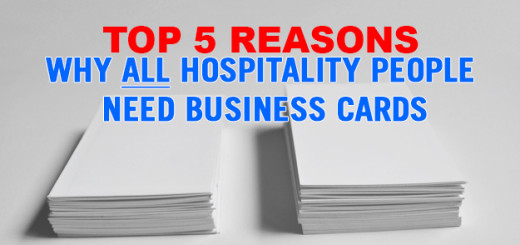Six Words to Avoid When Dealing With Guests
By Feature Writer Alan Fairweather
You probably realise how the wrong tone of voice and negative body language can cause problems when dealing with other people, particularly guests and even your staff. However, using the wrong words can also cause problems.
There are certain “trigger” words that cause people to become more difficult especially in emotionally charged situations and they should be avoided.
These include:
Have to – as in – ‘You’ll have to speak to the banqueting department yourself’
Can’t – as in – ‘I can’t do anything about that’ or ‘You can’t do that’
Try – as in – ‘I’ll try and do that for you today’
But – as in – ‘I agree with what you’re saying but……..’
Sorry – as in – ‘I’m sorry about that’
‘What do I say I hear you cry?’
Instead of the words ‘Have to’ which are very controlling type words, why not try – ‘Are you willing to…’ or just a straight ‘Will you….’
‘Can’t’ can be replaced with – ‘I’m unable to because….’
‘I’ll try’ which is very non-committal, can be replaced with something more honest – ‘This is what I can do’ or ‘This is what I’m unable to do’
‘But’ is a word that contradicts what was said before it, replace it with – ‘And’ or ‘However’ (which is a soft ‘but’)
Instead of saying ‘but’ you could leave it out altogether. For example; instead of – ‘I agree with what you’re saying but I can’t help you’ use – ‘I agree with what you’re saying. The reason I’m unable to help you is…’
At the end of the day the answer to a guest or one of your staff could be –‘no.’ However, choosing your words more carefully will have a more positive affect on how he or she reacts and ultimately responds to you.
‘Sorry’ is one of the words to avoid because it is so overused and it’s lost its value. Think of the number of times you’ve complained or commented about something and you hear – ‘Sorry about that.’ If you’re going to use the ‘sorry’ word then you need to use it as part of a whole sentence – ‘I’m sorry you’ve been receiving so many complaints Mary.’
Sometimes it’s appropriate to use the word ‘apologise’ instead of ‘sorry.’ ‘I apologise for not getting you that information sooner.’
Believe me; once you start to apply this you’ll have much smoother interactions with guests and staff.
About the author

 Article by Alan Fairweather, International Speaker and the author of, ‘How to be a Motivational Manager, ‘How to Manage Difficult People’ and ‘How to Make Sales When You Don’t like Selling’. Visit: www.themotivationdoctor.com, for more information.
Article by Alan Fairweather, International Speaker and the author of, ‘How to be a Motivational Manager, ‘How to Manage Difficult People’ and ‘How to Make Sales When You Don’t like Selling’. Visit: www.themotivationdoctor.com, for more information.



